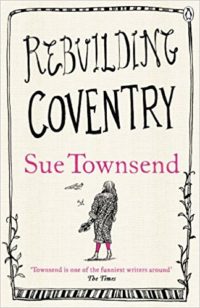In our house money was a god. But it was an angry, careful god
 Rebuilding Coventry
Rebuilding Coventry
by Sue Townsend
Sue Townsend was reliably both funny and socially relevant, and she doesn’t disappoint here. The title doesn’t refer to the Midlands town’s destruction in World War Two – it is, rather, about a woman called Coventry.
Coventry Dakin introduces herself with two facts: she’s beautiful and she killed a man. Specifically, her neighbour Gerald Fox. And now she’s on the run in London, without her handbag.
Killing Gerald was a spur of the moment decision, hence Coventry’s less-than-perfect running-away outfit. We learn the story behind the murder and the fallout for Coventry’s husband and children, interspersed between Coventry’s survival on the streets of the capital.
This being a comedy, there is an element of the ridiculous to much of the action. The murder weapon is an Action Man doll. She had been in the middle of cleaning her chimney, so she’s wearing old clothes and covered in soot. Her husband Derek is really only interested in his tortoises.
“In our house money was a god. But it was an angry, careful god. It wasn’t a question of worshipping money, but fearing it. Consequently we lived timid lives; only the financially secure can afford to be spontaneous.”
Inbetween the ridiculous and the action, there are serious points being made, specifically about marriage, gender, feminism, class and relative deprivation. Coventry has lived the kind of lower middle class life in which she has scrimped and saved to be comfortable. But now she is experiencing going without food or shelter, sleeping as little as possible because she doesn’t feel safe, being moved on by police and shunned or ignored by everyone else.
All the marriages in this book are unhappy, in different ways. Coventry and Derek married young and though they were in love then, and to an extent still are, Coventry knows that they’d both be happier with someone else. The men are generally very unaware of their wives’ true feelings and often deeply misogynous. They certainly mistrust any signs of their wives having any form of independence, even independence of thought.
“I’m 40 and I’ve never flown in an aeroplane; never driven a car; never, as an adult, been to the theatre or been ice-skating; never played tennis or been to a nightclub; never eaten Chinese food in a Chinese restaurant, worn pretty underwear or had a bank account or talked about sex, money and politics in mixed company. What is the Dow Jones Index? I admit, I don’t know. I’m an ignorant woman. How has this happened? When I was little I was considered clever; I won certificates for cycling proficiency, swimming and hurdling. And the books I used to read when I was 16! Adult books about important issues. Why did I stop reading the books?”
But it’s not all negative. Coventry’s survival, and the reactions of her friends and family, also reveal basic human kindness. Coventry’s motive for murder is mentioned so briefly that you might easily miss it first time round (I did), but it is far from a senseless or cold act. I warmed significantly to Coventry when I realised I had misunderstood the murder and I only have myself to blame as it’s right there in the opening lines of chapter three.
As always with Townsend, it’s the details that make both the comedy and the pathos work. The characters are wonderful but lean slightly to caricature, much as events tend slightly to melodrama. But there are small moments that are true observations of life, moments of honesty that pulled me up.
First published 1988 by Methuen.
Source: Present from my Dad.